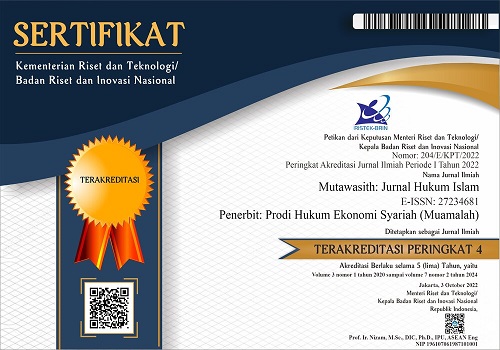The Application of Artificial Intelligence in Islamic Law Discovery
Abstract
This study comprehensively explores using artificial intelligence (AI) to discover Islamic law. This study relies on literature study with literature analysis conducted in an integrative and comprehensive manner. The results of this study indicate that the use of artificial intelligence in the discovery of Islamic law provides deep and efficient analytical capabilities, enabling the identification of Islamic legal trends, agreements, and differences between schools. However, challenges arise regarding transparency, bias, and the role of humans in the decision-making process. To combat this, solid ethical guidelines and strict regulations are needed. Artificial intelligence also influences the development of Islamic law by assisting in adaptation to the modern context, bridging the gap between Islamic law and technology, and facilitating a more inclusive and global understanding of Islamic law. In this context, collaboration between Islamic jurists, computer scientists, and religious communities is critical to harnessing artificial intelligence's full potential in supporting relevant and responsive Islamic law in changing times.
Downloads
References
Ahmad, Kashif, Majdi Maabreh, Mohamed Ghaly, Khalil Khan, Junaid Qadir, and Ala Al-Fuqaha. “Developing Future Human-Centered Smart Cities: Critical Analysis of Smart City Security, Data Management, and Ethical Challenges.” Computer Science Review 43 (2022): 100452. https://doi.org/10.1016/j.cosrev.2021.100452.
Ahmed, Bashir. “The Status of the Use of Artificial Intelligence in Ijtihad.” Karachi Islamicus 1, no. 1 (2021): 1–14. https://doi.org/10.58575/ki.v1i1.5.
Azmi, Aqil M, Abdulaziz O Al-Qabbany, and Amir Hussain. “Computational and Natural Language Processing Based Studies of Hadith Literature: A Survey.” Artificial Intelligence Review 52 (2019): 1369–1414. https://doi.org/10.1007/s10462-019-09692-w.
Bashir, Muhammad Huzaifa, Aqil M Azmi, Haq Nawaz, Wajdi Zaghouani, Mona Diab, Ala Al-Fuqaha, and Junaid Qadir. “Arabic Natural Language Processing for Qur’anic Research: A Systematic Review.” Artificial Intelligence Review 56, no. 7 (2023): 6801–54. https://doi.org/10.1007/s10462-022-10313-2.
Benjamin, Rebekah George. “Reconstructing Readability: Recent Developments and Recommendations in the Analysis of Text Difficulty.” Educational Psychology Review 24 (2012): 63–88. https://doi.org/10.1007/s10648-011-9181-8.
Brayne, Sarah. “Big Data Surveillance: The Case of Policing.” American Sociological Review 82, no. 5 (2017): 977–1008. https://doi.org/10.1177/0003122417725865.
Feng, Mingchen, Jiangbin Zheng, Jinchang Ren, Amir Hussain, Xiuxiu Li, Yue Xi, and Qiaoyuan Liu. “Big Data Analytics and Mining for Effective Visualization and Trends Forecasting of Crime Data.” IEEE Access 7 (2019): 106111–23. https://doi.org/10.1109/ACCESS.2019.2930410.
Gerke, Sara, Timo Minssen, and Glenn Cohen. “Ethical and Legal Challenges of Artificial Intelligence-Driven Healthcare.” In Artificial Intelligence in Healthcare, 295–336. Elsevier, 2020. https://doi.org/10.1016/B978-0-12-818438-7.00012-5.
Hamid, Rizal Al, Arif Sugitanata, and Suud Sarim Karimullah. “Sinkronisasi Pendekatan Sosiologis Dengan Penemuan Hukum Islam Sui Generis Kum Empiris.” Bertuah Jurnal Syariah Dan Ekonomi Islam 4, no. 1 (2023): 48–60. https://doi.org/https://doi.org/10.56633/jsie.v4i1.553.
Jamal, K, R Kurniawan, A S Batubara, M Z A Nazri, F Lestari, and P Papilo. “Text Classification on Islamic Jurisprudence Using Machine Learning Techniques.” In Journal of Physics: Conference Series, 1566:12066. IOP Publishing, 2020. https://doi.org/10.1088/1742-6596/1566/1/012066.
Jarrahi, Mohammad Hossein. “Artificial Intelligence and the Future of Work: Human-AI Symbiosis in Organizational Decision Making.” Business Horizons 61, no. 4 (2018): 577–86. https://doi.org/10.1016/j.bushor.2018.03.007.
Kamila, Manoj Kumar, and Sahil Singh Jasrotia. “Ethical Issues in the Development of Artificial Intelligence: Recognizing the Risks.” International Journal of Ethics and Systems, 2023. https://doi.org/10.1108/IJOES-05-2023-0107.
Kriebitz, Alexander, and Christoph Lütge. “Artificial Intelligence and Human Rights: A Business Ethical Assessment.” Business and Human Rights Journal 5, no. 1 (2020): 84–104. https://doi.org/10.1017/bhj.2019.28.
Leavy, Susan, Barry O’Sullivan, and Eugenia Siapera. “Data, Power and Bias in Artificial Intelligence.” ArXiv Preprint ArXiv:2008.07341, 2020. https://doi.org/10.48550/arXiv.2008.07341.
Munshi, Amr A, Wesam H AlSabban, Abdullah Tarek Farag, Omar Essam Rakha, Ahmad A Al Sallab, and Majid Alotaibi. “Towards an Automated Islamic Fatwa System: Survey, Dataset and Benchmarks.” International Journal of Computer Science and Mobile Computing 10, no. 4 (2021): 118–31. https://doi.org/10.47760/ijcsmc.2021.v10i04.017.
Noguerol, Teodoro Martín, Félix Paulano-Godino, María Teresa Martín-Valdivia, Christine O Menias, and Antonio Luna. “Strengths, Weaknesses, Opportunities, and Threats Analysis of Artificial Intelligence and Machine Learning Applications in Radiology.” Journal of the American College of Radiology 16, no. 9 (2019): 1239–47. https://doi.org/10.1016/j.jacr.2019.05.047.
Ntoutsi, Eirini, Pavlos Fafalios, Ujwal Gadiraju, Vasileios Iosifidis, Wolfgang Nejdl, Maria‐Esther Vidal, Salvatore Ruggieri, Franco Turini, Symeon Papadopoulos, and Emmanouil Krasanakis. “Bias in Data‐driven Artificial Intelligence Systems—An Introductory Survey.” Wiley Interdisciplinary Reviews: Data Mining and Knowledge Discovery 10, no. 3 (2020): e1356. https://doi.org/https://doi.org/10.1002/widm.1356.
Polat, Ali, Shoaib Khan, and Usman Bashir. “An Inquiry into the Application of Artificial Intelligence on Fatwa.” In Digital Transformation in Islamic Finance, 273–87. Routledge, 2022. https://doi.org/10.4324/9781003262169-18.
Shahrouri, Ahmad Daoud Mohammad. “The Cultural and Social Impact of Artificial Intelligence on Islamic Law Standard: A Fundamental Purposeful Study.” In Conference on Sustainability and Cutting-Edge Business Technologies, 194–201. Springer, 2023. https://doi.org/10.1007/978-3-031-42455-7_18.
Singer, Julia. “Fatwas from Islamweb. Net on Robotics and Artificial Intelligence.” Artificial Intelligence in the Gulf: Challenges and Opportunities, 2021, 279–301. https://doi.org/10.1007/978-981-16-0771-4_12.
Sugitanata, Arif, Suud Sarim Karimullah, and Rizal Al Hamid. “Hukum Positif Dan Hukum Islam: Analisis Tata Cara Menemukan Hukum Dalam Kacamata Hukum Positif Dan Hukum Islam.” JURISY: Jurnal Ilmiah Syariah 3, no. 1 (2023): 1–22. https://doi.org/10.37348/jurisy.v3i1.242.
Tien, James M. “Internet of Things, Real-Time Decision Making, and Artificial Intelligence.” Annals of Data Science 4 (2017): 149–78. https://doi.org/10.1007/s40745-017-0112-5.
Tsourlaki, Sofia. “Artificial Intelligence on Sunni Islam’s Fatwa Issuance in Dubai and Egypt.” Islamic Inquiries 1, no. 2 (2022): 107–25. https://doi.org/10.22034/IS.2022.339182.1082.
Walter, Wencke, Claudia Haferlach, Niroshan Nadarajah, Ines Schmidts, Constanze Kühn, Wolfgang Kern, and Torsten Haferlach. “How Artificial Intelligence Might Disrupt Diagnostics in Hematology in the near Future.” Oncogene 40, no. 25 (2021): 4271–80. https://doi.org/10.1038/s41388-021-01861-y.
Wignell, Peter, Kevin Chai, Sabine Tan, Kay O’Halloran, and Rebecca Lange. “Natural Language Understanding and Multimodal Discourse Analysis for Interpreting Extremist Communications and the Re-Use of These Materials Online.” Terrorism and Political Violence 33, no. 1 (2021): 71–95. https://doi.org/10.1080/09546553.2018.1520703.
Wu, Tim. “Will Artificial Intelligence Eat the Law? The Rise of Hybrid Social-Ordering Systems.” Columbia Law Review 119, no. 7 (2019): 2001–28. https://www.jstor.org/stable/26810857.
Authors retain copyright and grant the journal right of first publication with the work simultaneously licensed under a Creative Commons Attribution 4.0 International License that allows others to share the work with an acknowledgement of the work's authorship and initial publication in this journal.
















.png)




